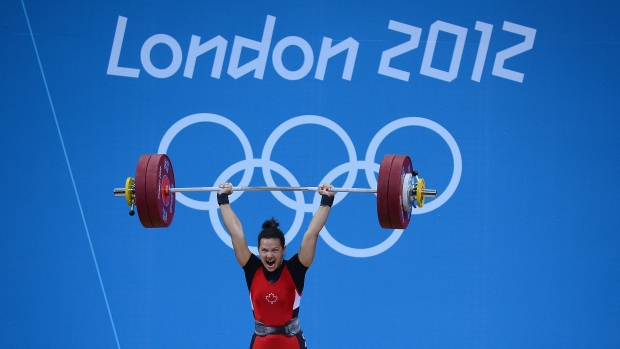Jul 27, 2016
Canadian Girard may get London gold
Canadian weightlifter Christine Girard's bronze medal from the London Olympics could be upgraded to gold after the two women who finished ahead of her were nabbed in doping retests.
The Canadian Press

Christine Girard appears poised to become Canada's first Olympic gold medallist in weightlifting, but she may have to wait years to celebrate the historic achievement.
Girard learned Wendesday that her bronze medal from the London Olympics may be upgraded to gold after the two women who finished ahead of her were nabbed in doping retests.
"I'm really, really proud that's for sure, I'm even more proud it's the first gold medal for my sport and our country. It's pretty amazing," Girard told The Canadian Press in a phone interview. "It's bittersweet. I would have really liked to have had the proper ceremony, have our flag and hear that song that makes us cry on the podium, but at the same time I'm happy that it got cleared up."
The International Weighlifting Federation announced Wednesday that samples of 11 weightlifters from the 2012 Games showed positive results.
Svetlana Tsarukaeva of Russia, who finished second in the women's 63-kilogram division, was among the 11 athletes, testing positive for the steroid dehydrochlormethyltestosterone.
Gold medallist Maiya Maneza of Kazakhstan was already caught testing positive for stanozolol in an earlier batch of retesting.
Both Tsarukaeva and Maneza have been provisionally suspended but it will likely take months, or even years, for the Olympic medals to be redistributed.
"These people still have a right to appeal and the right to a second test," Canadian Weightlifting Federation president Paul Barrett said.
Girard isn't holding her breath waiting for the gold.
"I heard it could take up to two years, so I have no expectations on time and no one has contacted me so far, so I have no idea," she said.
Barrett said he has not been contacted by either the IWF or the Canadian Olympic Committee about a possible upgrade either.
Girard said she wasn't surprised by the positive tests.
"We knew it was part of our sport, some girls don't really look like girls anymore so unfortunately we kind of knew (there was doping)," she said. "I just wasn't expecting it to explode that much and so quickly and so many at once, that's more the surprise."
Medals in London were determined by the sum of each lifter's best result in the snatch and the clean and jerk, with three attempts allowed in each.
Girard narrowly missed out on silver in 2012, finishing third with a total of 236 kilograms behind Tsarukaeva at 237. Maneza totalled 245 kilograms.
Girard placed fourth at the 2008 Beijing Olympics. The CWF president said Girard was tested a lot during her career.
"She has been," Barrett said. "She would have tested at both those Olympics because she was a medallist (in 2012) and she was in fourth place (in 2008). "I know she's been tested on many occasions. We won a gold medal at the Pan Americans in 2011. She won medals at the Commonwealth Games, so she's been tested."
Girard, who is now 31 and retired from competing, said she has been regularly tested since she was 14.
"I got tested any day, any time," added Girard. "Two days after my wedding they were at my house at six in the morning, woke up everybody in my house to test me. That's what we do in Canada, which can be annoying for athletes, but it's amazing because it's our values and we believe in true sport."
Women's weightlifting made its Olympic debut in 2000.
Girard grew up in Rouyn-Noranda, Que., but now lives in the Vancouver area. She is married with children. She and husband Walter Bailey co-founded the Kilophile Weightlifting Club in Surrey, B.C.
She wouldn't be the first Canadian to move up the podium because of doping.
Shot-putter Dylan Armstrong of Kamloops, B.C., was upgraded from fourth to the bronze medal almost seven years after the 2008 Beijing Olympics due to doping.
Cross-country skier Beckie Scott of Vermilion, Alta., moved up from bronze to gold two and a half years after the 2002 Winter Games when the medallists ahead of her were caught doping.
